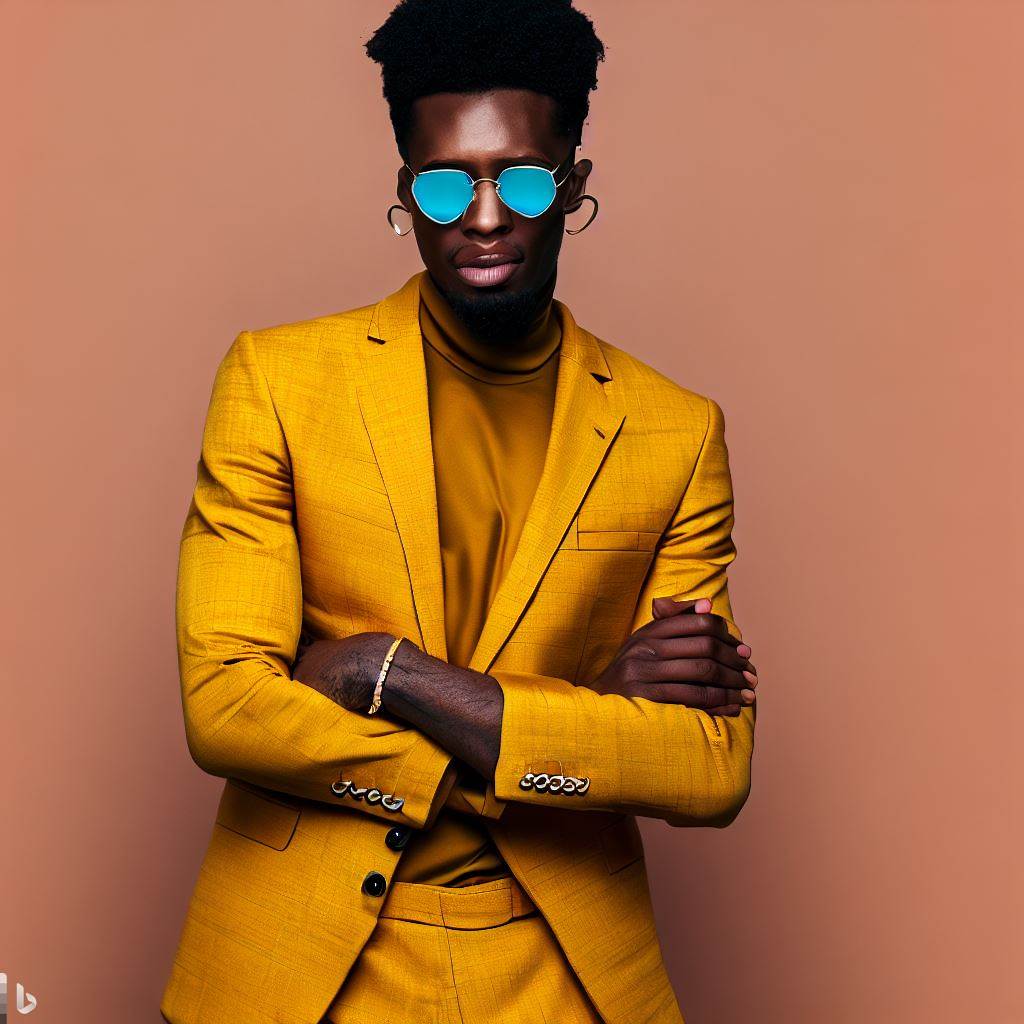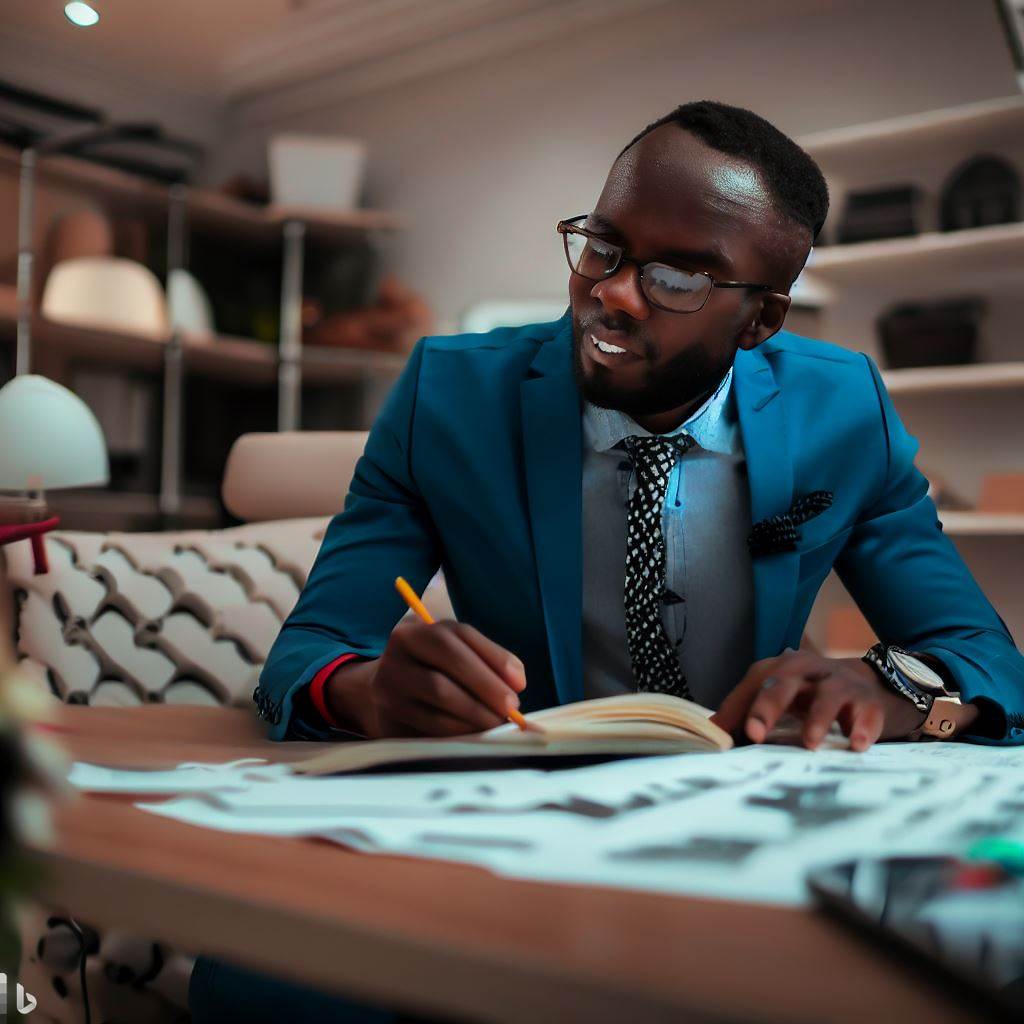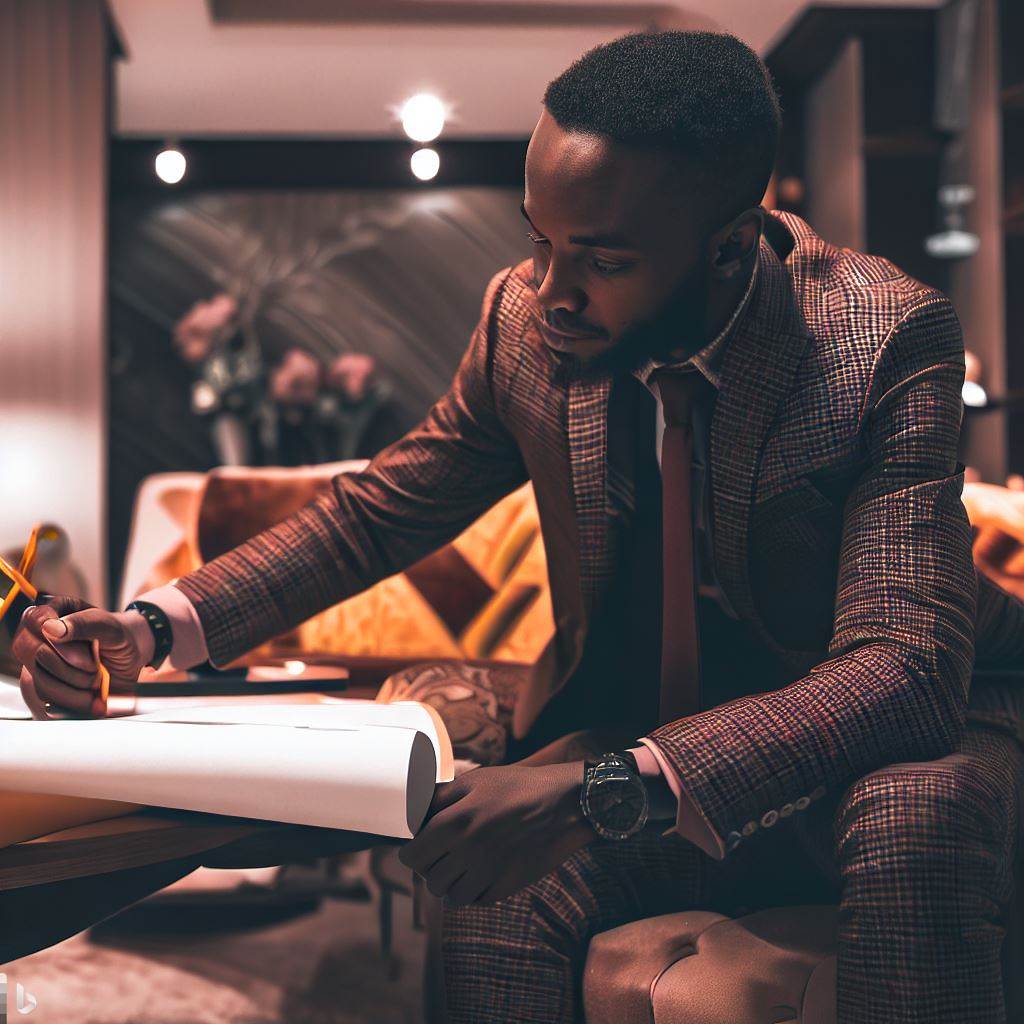Introduction
The fashion industry in Nigeria is a thriving sector that showcases the country’s unique style and creativity.
Finding a job in fashion design in Nigeria offers numerous opportunities for growth and success in the industry.
The purpose of this blog post is to provide a comprehensive guide on how to find a job in fashion design in Nigeria.
Understanding the Fashion Design Industry in Nigeria
A. Overview of the Nigerian fashion design industry
- Nigeria’s fashion design industry has experienced significant growth in recent years.
- It is a vibrant and dynamic industry that contributes to the country’s economy.
- The sector is made up of numerous fashion designers, brands, and fashion houses.
- There is a rich diversity of styles and aesthetics within the Nigerian fashion design industry.
- The industry encompasses various segments such as clothing, accessories, and footwear.
- Both traditional and contemporary fashion styles are embraced in Nigeria.
- Local materials, fabrics, and techniques are often incorporated into Nigerian fashion designs.
B. Key players and renowned fashion designers in Nigeria
- Some of the key players in the Nigerian fashion design industry include top designers, fashion brands, and influential personalities.
- Renowned fashion designers such as Deola Sagoe, Lisa Folawiyo, and Mai Atafo have gained international recognition.
- These designers have showcased their works on global runways and dressed international celebrities.
- Fashion brands like Tiffany Amber, Maki Oh, and Orange Culture have also made significant contributions to the industry.
- Influential personalities like Omoyemi Akerele and Folake Coker have played pivotal roles in elevating Nigerian fashion globally.
C. Current trends and styles in Nigerian fashion design:
- Nigerian fashion design embraces both traditional and contemporary styles, creating a unique fusion.
- Traditional styles such as Ankara prints, adire fabrics, and Aso Ebi outfits remain popular.
- Contemporary styles include minimalistic designs, bold colors, and unconventional silhouettes.
- Nigerian fashion designers often experiment with innovative and avant-garde design techniques.
- The use of Nigerian and African-inspired prints and motifs is a distinguishing feature of the industry.
- There is an increasing focus on sustainability and ethical fashion practices within the Nigerian fashion design industry.
- Emerging designers are also gaining recognition for their creativity and unique interpretations of Nigerian fashion.
Therefore, the Nigerian fashion design industry has witnessed remarkable growth and showcases immense talent.
It is a dynamic sector that combines traditional and contemporary elements to create unique and innovative designs.
Renowned fashion designers, brands, and influential personalities have played significant roles in elevating Nigerian fashion on the global stage.
The industry embraces a diverse range of styles and aesthetics, incorporating local materials and techniques.
Nigerian fashion designers continue to experiment with new trends, styles, and design techniques, pushing boundaries and staying at the forefront of the fashion world.
With a focus on sustainability and ethical fashion practices, the industry is poised to make even greater strides in the future.
Education and Training
A. Importance of formal education in fashion design
Formal education plays a crucial role in the development of aspiring fashion designers in Nigeria.
It equips them with fundamental knowledge and skills necessary for a successful career in the industry.
Here are some reasons why formal education is important:
- Foundation of knowledge: Formal education provides a solid foundation of theoretical and practical knowledge in fashion design. This knowledge is essential for understanding the principles, techniques, and history of the field.
- Professional credibility: Employers and clients often prioritize candidates with formal education as it demonstrates their commitment and dedication to the craft. It adds credibility to their skills and increases their employment prospects.
- Networking opportunities: Fashion design schools and universities offer a platform for students to connect with industry professionals, fellow designers, and potential mentors. These connections can open doors to internships, collaborations, and job opportunities.
- Exposure to industry standards: Through formal education, aspiring fashion designers gain insights into the current trends, industry standards, and business practices. They learn how to create marketable designs while remaining relevant in a rapidly changing fashion landscape.
B. Training options available in Nigeria for aspiring fashion designers
Nigeria offers various training options for individuals aspiring to pursue a career in fashion design.
These options cater to different learning preferences and career goals.
Here are two prominent options:
Transform Your Career in Nigeria
Discover unmatched expertise with our personalized Career Consulting service. Navigate Nigeria’s job market with a strategy tailored just for you.
Get Started- Fashion design schools and universities: In Nigeria, there are several reputable fashion design schools and universities that offer comprehensive programs in fashion design.
These programs cover various aspects of the field, including fashion illustration, patternmaking, garment construction, and fashion marketing. - Workshops and short-term courses: For individuals seeking more flexible and specialized training, workshops and short-term courses are an excellent choice.
These programs usually focus on specific skills such as draping, textile design, or fashion business management. They provide targeted learning experiences for those with limited time or specific interests.
C. Benefits of acquiring relevant skills and knowledge
Acquiring relevant skills and knowledge in fashion design is essential for career growth and success.
Here are some benefits of pursuing education and training:
- Enhanced creativity and design abilities: Formal education equips aspiring fashion designers with the necessary skills to explore their creativity and translate their ideas into tangible designs.
- Improved technical skills: Through education and training, designers develop technical skills related to pattern-making, garment construction, and the use of design software. These skills increase their efficiency and precision in creating garments.
- Business acumen: Fashion design education often includes courses on fashion marketing, business strategy, and entrepreneurship. This knowledge empowers designers to navigate the business side of the industry successfully.
- Professional growth opportunities: With relevant skills and knowledge, fashion designers can seize opportunities for career advancement, such as promotions, leadership roles, and starting their own fashion labels.
- Competitive advantage: Acquiring formal education and training sets aspiring fashion designers apart from the competition. It demonstrates their commitment, passion, and expertise, giving them an edge in the industry.
Educational and training opportunities in fashion design are abundant in Nigeria.
Aspiring fashion designers should consider pursuing formal education or enrolling in specialized courses to maximize their potential and thrive in this dynamic industry.
Read: The Role of Culture in Nigerian Fashion Design Industry
Building a Fashion Design Portfolio
A. Importance of a strong fashion design portfolio
- A fashion design portfolio is essential for showcasing your skills and creativity to potential employers.
- It demonstrates your ability to conceptualize, design, and execute fashion projects effectively.
- A well-curated portfolio can set you apart from other candidates and increase your chances of landing a job in the competitive fashion industry.
B. Elements to include in a fashion design portfolio
- Sketches and illustrations: Include a variety of hand-drawn or digitally created fashion sketches that showcase your design aesthetic and technical skills.
- Fabric and material samples: Display swatches of fabrics and materials you have worked with, highlighting your understanding of texture, drape, and color.
- Examples of completed design projects: Include high-quality photographs or digital images of your finished garments or fashion accessories.
C. Tips for creating an impressive portfolio
- Curate your best work: Select a range of your strongest designs that demonstrate your versatility as a fashion designer.
- Organize your portfolio: Structure your portfolio with a clear and logical flow, grouping related designs together.
- Showcase your process: Include sketches, inspiration boards, and progress photos to give employers insights into your design development.
- Include a variety of designs: Demonstrate your ability to design for different occasions, target markets, and seasons.
- Keep it visually consistent: Use a cohesive color scheme, typography, and layout throughout your portfolio to create a professional and polished look.
- Highlight your technical skills: If you have expertise in patternmaking, draping, or other specialized techniques, showcase your proficiency in these areas.
- Keep it concise: Aim for quality over quantity and avoid overwhelming your portfolio with too many pieces.
- Consider the format: Decide whether a physical portfolio, a digital portfolio, or a combination of both best suits your needs and the requirements of potential employers.
- Regularly update your portfolio: Continuously add new designs and remove outdated or weaker pieces to keep your portfolio fresh and relevant.
A strong fashion design portfolio is an invaluable tool for securing a job in the Nigerian fashion industry.
It showcases your skills, creativity, and unique design aesthetic.
By including sketches, fabric samples, and examples of completed projects in your portfolio, you can effectively demonstrate your proficiency to potential employers.
Follow the tips provided above to curate an impressive portfolio that sets you apart and increases your chances of landing your dream fashion design job.
Remember to keep your portfolio updated and visually consistent to leave a lasting impression on hiring managers
Read: How to Become a Successful PR Specialist in Nigeria
Networking and Building Connections
A. Significance of networking in the fashion industry
Networking plays a crucial role in the fashion industry, enabling aspiring fashion designers to expand their professional connections and opportunities.
It allows individuals to establish relationships with influential individuals who can help them progress in their careers.
B. Ways to network effectively in Nigeria
- Attending fashion events and exhibitions: Attending fashion events and exhibitions provides a platform to meet industry professionals, showcase work, gain exposure, and form connections with potential employers and clients.
- Joining professional fashion design organizations: Joining professional fashion design organizations in Nigeria such as the Fashion Designers Association of Nigeria (FADAN) or the Fashion Business Networking Group helps to connect with like-minded individuals and industry experts.
- Utilizing social media and online platforms: Using social media platforms like Instagram, Twitter, Facebook, and LinkedIn is vital for networking.
It allows fashion designers to showcase their work, connect with industry professionals, and keep abreast of the latest trends and opportunities.
C. Establishing relationships with potential employers and mentors
Building relationships with potential employers and mentors is essential for career growth in the fashion industry.
Here are some steps to foster these connections:
- Research and identify potential employers and mentors: Before networking, research and identify individuals or companies that align with your career goals and values. This helps you approach the right people and make a meaningful connection.
- Attend industry-specific events and workshops: Participate in fashion-related events, seminars, and workshops, where you can meet potential employers and mentors. These gatherings provide opportunities to learn from industry veterans and showcase your skills.
- Engage in meaningful conversations: Networking isn’t just about handing out business cards. Engage in meaningful conversations, ask questions, and show a genuine interest in the other person’s work. Building a personal connection is just as important as showcasing your skills.
- Follow up: After meeting potential employers or mentors, follow up with a personalized email or message to express your gratitude and interest in maintaining a professional relationship. This demonstrates professionalism and keeps you on their radar.
- Seek mentorship opportunities: Mentorship is invaluable in the fashion industry. Actively seek out mentors who can guide you, offer advice, and help you navigate the industry. Build a relationship based on trust and mutual respect.
Networking and building connections are crucial steps in finding a job in the Nigerian fashion industry.
These strategies help aspiring fashion designers establish relationships with influential individuals, improve their industry knowledge, and increase their chances of securing employment.
By actively participating in networking events, joining professional organizations, utilizing social media, and forming connections with potential employers and mentors, you can effectively enhance your career prospects in the exciting world of fashion design.
Read: Education for Fashion Designers in Nigeria: What You Need

Job Opportunities in Fashion Design in Nigeria
A. Overview of the job market for fashion designers in Nigeria
- The fashion design industry in Nigeria is growing rapidly and offers numerous job opportunities.
- There is a high demand for skilled fashion designers due to the country’s vibrant fashion scene.
- Both local and international fashion brands are investing in Nigeria, creating more job openings.
- Job prospects are promising, especially for those with creativity and a strong sense of style.
B. Various career options available in the field
1. Working for established fashion houses or designers
- Many renowned fashion houses and designers in Nigeria are constantly looking for talented professionals.
- They offer opportunities to work on prestigious projects and gain invaluable experience.
2. Starting a personal fashion label
- Entrepreneurial fashion designers can establish their own brands and become successful entrepreneurs.
- This option allows for creative freedom and the ability to showcase one’s unique style.
3. Freelancing or offering design services
- Fashion designers can work independently, offering their design services to clients on a freelance basis.
- This gives them the flexibility to work on different projects and collaborate with various clients.
C. Factors to consider when choosing a job in fashion design
1. Passion and interest
- It is essential to have a genuine passion for fashion design to excel in this field.
- Choose a job that aligns with your interests and allows you to express your creativity.
2. Skill set and capabilities
- Assess your skills and capabilities to determine which career option suits you best.
- Consider your strengths, such as sketching, pattern making, and garment construction.
3. Market demand and competition
- Research the current market demand for different fashion design careers in Nigeria.
- Understand the level of competition and identify where your skills can stand out.
4. Work environment and culture
- Consider the work environment and culture that you thrive in.
- Some fashion designers prefer a fast-paced, high-pressure environment, while others prefer a more relaxed setting.
5. Networking opportunities
- Networking is crucial in the fashion industry, so choose a job that allows you to expand your professional network.
- Look for opportunities to collaborate with other designers, attend industry events, and connect with influential individuals.
In review, the fashion design industry in Nigeria offers a wide range of job opportunities for talented and passionate individuals.
Whether you choose to work for established fashion houses, start your own label, or offer freelance services, there are viable career paths to pursue.
When considering a job in fashion design, factors such as your passion, skill set, market demand, work environment, and networking opportunities should be taken into account.
By carefully considering these factors, you can make an informed decision and find a job in fashion design that aligns with your goals and aspirations.
Read: Nigeria’s Animation Industry: Past, Present, Future
Publish Your Professional Profile, Business or Brand
Showcase your expertise, gain trust, and boost visibility instantly on Professions.ng.
Publish NowUncover the Details: Using Tech in the Illustrator Profession in Nigeria
Job Search Strategies and Resources
A. Strategies for finding job opportunities in fashion design
- Stay updated with the latest trends and developments in the fashion industry.
- Attend fashion-related events, such as fashion shows and trade fairs, to network and discover job opportunities.
- Join fashion design associations and organizations to connect with professionals in the field.
- Seek internships or apprenticeships with established fashion designers or fashion houses.
- Build a strong online presence by showcasing your portfolio on social media and fashion-related platforms.
- Customize your resume and cover letter to highlight your relevant skills and experiences in fashion design.
- Prepare a professional portfolio showcasing your best work to present to potential employers.
- Utilize job search platforms and online resources specific to the fashion industry.
B. Online job portals and websites for fashion design jobs in Nigeria
- Jobberman
- Ngcareers
- Hot Nigerian Jobs
- Indeed Nigeria
- Jiji Nigeria
- Nigerian Job Portal
- Career Builder Nigeria
C. Utilizing professional networks and industry contacts for job referrals
- Join fashion design associations, such as the Fashion Designers Association of Nigeria (FADAN).
- Attend industry events and connect with professionals working in the fashion industry.
- Reach out to mentors or established fashion designers for guidance and potential job referrals.
- Participate in online forums and communities dedicated to fashion design in Nigeria.
- Utilize social media platforms, such as LinkedIn, to connect with professionals and industry contacts.
- Volunteer or assist at fashion-related events to network and establish industry contacts.
- Stay in touch with your fashion school alumni network for job opportunities and referrals.
By implementing these job search strategies and utilizing the resources available, aspiring fashion designers in Nigeria can increase their chances of finding rewarding job opportunities in the industry.
It is important to stay proactive, network, and continuously improve your skills to stand out among the competition. Good luck!
Interview and Job Application Tips
When it comes to pursuing a career in fashion design in Nigeria, a well-rounded skill set is crucial.
However, landing a job in this competitive industry requires more than just talent and creativity.
To stand out from the crowd, you need to ace your job application and nail the interview.
Here are some tips to help you prepare:
A. Preparing a Professional Fashion Design Resume
- Start with a clear and concise summary of your skills, experiences, and achievements.
- Highlight any relevant internships, freelance work, or fashion design projects you have completed.
- Showcase your technical skills, such as pattern making, sewing, and knowledge of different fabrics.
- Include any special awards, recognitions, or exhibitions where your work has been showcased.
- Use visual aids, such as photographs or sketches, to demonstrate your design style.
- Provide references from industry professionals or previous employers who can vouch for your abilities.
- Proofread your resume for any grammatical errors or typos before submitting it.
B. Dressing Appropriately for a Job Interview in the Fashion Industry
- Research the company’s dress code and align your outfit with their aesthetic.
- Choose attire that reflects your personal style while still looking professional.
- Opt for well-tailored clothing that fits you perfectly and complements your figure.
- Accessorize thoughtfully, keeping it minimal yet fashionable.
- Pay attention to your grooming and ensure you look neat and well put together.
- Wear comfortable shoes that you can confidently walk in.
C. Techniques for Showcasing Creativity and Skills During an Interview
- Prepare a portfolio showcasing your best work, including sketches, illustrations, and fashion design projects.
- Be ready to discuss the inspiration behind your designs and the techniques you used to create them.
- Show your enthusiasm for the fashion industry and explain why you are passionate about pursuing a career in this field.
- Highlight your ability to work as part of a team by sharing instances where you collaborated with others.
- Be prepared to answer technical questions about fabrics, trends, and fashion design techniques.
- Demonstrate your problem-solving skills by discussing challenges you have faced and how you overcame them.
- Ask thoughtful questions about the company, its values, and the role you are applying for.
- Follow up with a thank-you note or email expressing your appreciation for the opportunity to interview.
By following these interview and job application tips, you will increase your chances of landing a fashion design job in Nigeria.
Remember, confidence, professionalism, and a strong showcase of your skills and creativity are key to impressing potential employers in the fashion industry.
Uncover the Details: Fashion Design Competitions in Nigeria: A Must-Participate
Conclusion
A. Recap of key points discussed in the blog post
- Fashion design is a thriving industry in Nigeria with many job opportunities available.
- Networking and building connections are crucial for finding job opportunities in the fashion industry.
- Professional training and education in fashion design are important for career growth.
- Creating a portfolio and showcasing your work is essential in attracting potential employers.
- Understanding the market trends and consumer preferences can give you a competitive edge in the industry.
B. Encouragement and motivation for aspiring fashion designers in Nigeria
Embarking on a career in fashion design can be challenging but also incredibly rewarding.
Keep pushing forward, stay determined, and believe in yourself and your abilities.
With passion and hard work, success is within your reach.
C. Importance of perseverance and continuous learning in the fashion industry
In a constantly evolving industry like fashion, it is crucial to stay updated and adapt to new trends and technologies.
Never stop learning and improving your skills. Embrace challenges and setbacks as opportunities for growth.
With perseverance, dedication, and a hunger for knowledge, you can achieve great things in the fashion industry.




